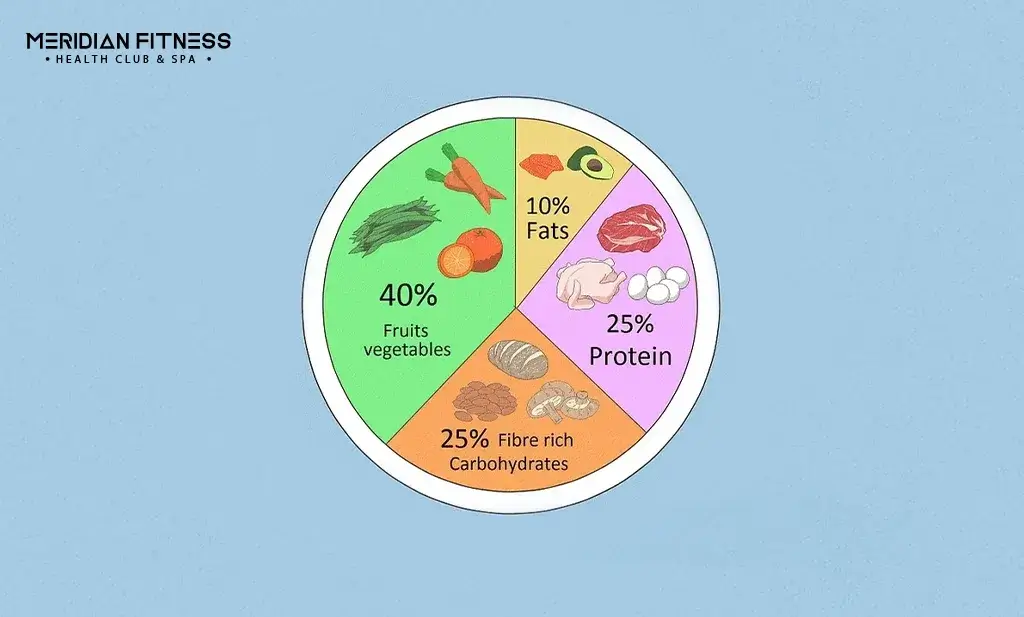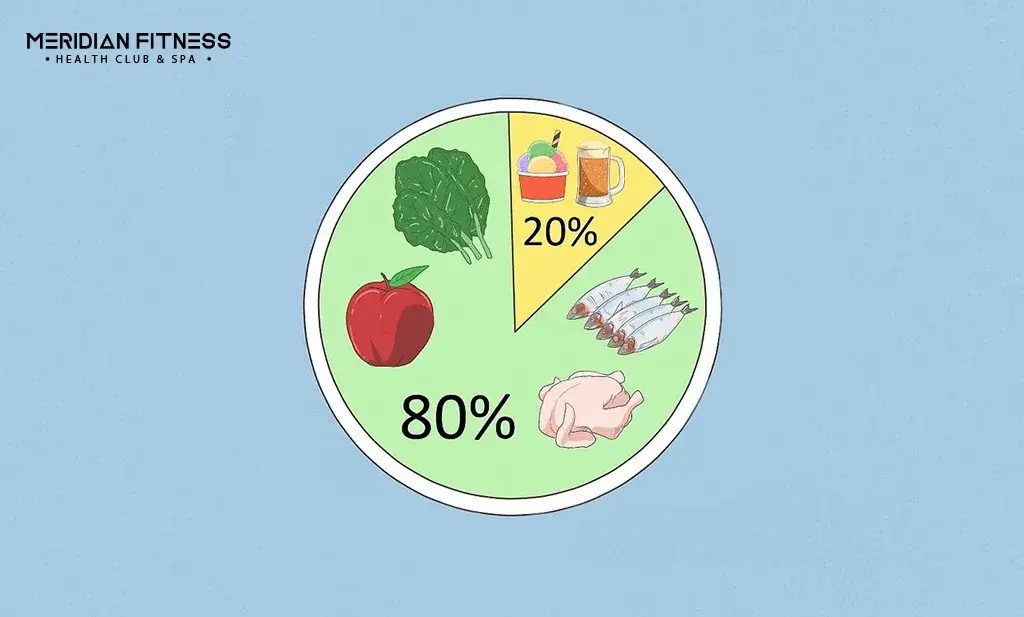Lots of people are confused between these two totally opposite terms: “Dieting and Eating Healthy.” Let’s dig deep into them and what the differences are, as well as help you in starting and maintaining a healthy eating lifestyle from the bottom.
Many people use dieting and eating healthy interchangeably, but dieting typically focuses on short-term weight loss through cutting down on food. On the other hand, eating healthy is a long-term approach that revolves around consuming a balanced variety of nutrient-rich foods from all food groups.
This is why dieticians and nutritionists suggest eating healthy rather than dieting!
As eating healthy is a holistic and more sustainable approach, it encompasses all the essential aspects of our healthy diet. This lowers the chance of developing numerous chronic diseases and fosters long-term well-being. Furthermore, a well-balanced nutritional diet not only helps you in fat loss it also supports the immune system, decreases the chances of obesity, and supports cardiovascular health.
So, How To Start A Healthy Diet?
A journey towards a healthy eating lifestyle can be thrilling and difficult. It starts with knowing what your body needs, making wise decisions, and forming enduring routines that feed you from the inside out. One golden rule that helps you keep up with this is to “Focus on making sustainable changes bit by bit in your life that you can maintain over time.”
Today, everyone wants to eat healthily and understands that later, achieving these two different things requires some decisions. If you are looking for an easy way to crack the code of a healthy diet, continue reading. This comprehensive guide will equip you with expert and simple-to-carry tips on how to start eating healthy today and now!
1. Set Realistic Goals
To keep yourself motivated and on track, it is very important to set your achievable, calculative goals. Furthermore, one could say that establishing attainable goals is the cornerstone of any successful health journey. Rather than seeking quick fixes, concentrate on small adjustments that you can actually make to your daily schedule.
For example, you will lose 6 lbs in a month. Swapping sugary drinks for water, adding vegetables to each meal, or reducing portion sizes will help you adjust accordingly.
2. Embrace Mindful Eating, Eat Slower
In today’s fast-paced world, eating mindlessly has become the norm while using mobile phones or working. Many medical professionals advise against that because hormones regulate how much you eat and when you feel full. Therefore, mindful eating promotes slowing down, enjoying every bite, and paying attention to all of your body’s hunger cues.
Moreover, according to PubMed Central studies, eating slowly effectively reduces calorie gains and helps you reduce weight. Lastly, this will not only enhance your enjoyment of food but also prevent overeating and promote better digestion.
3. Prioritise Whole Foods
Whole foods, in their natural or minimally processed state, offer a wealth of nutrients that your body craves and needs. For example, full fruits, vegetables, whole grains, lean proteins, greens, and healthy fats are the stars of the meals. These nutrient-rich foods provide vitamins, minerals, fibre, and antioxidants that support against post-exercise inflammation.

4. Plan Your Meals
Meal planning makes maintaining a healthy diet much easier. By setting aside time each week to organise your meals and snacks, you reduce the likelihood that you will reach for unhealthy food out of convenience. Consider your dietary preferences, nutritional needs, and schedule to create a meal plan that works for you.
Planning And Preparation
When you go plan your meals, follow these rules:
- Always prefer the complete and nutrition-balanced diet
- Pick the lean protein form over the fatty one
- Include 5-8 fruits in your diet and one portion of vegetables
- whole grains, not refined and processed grains
- Add healthy sources of fat
5. Hydrate Intake Adequate Fluids

Although water does not belong to any food group or contain nutrients, it is essential for countless bodily functions, from digestion to temperature regulation. That’s why doctors keep reminding us to drink adequate water. On average, everyone has to intake at least 8 glasses of water every day.
Additionally, many health professionals at the Mayo Clinic recommend consuming at least one glass of water, which is equal to three litres. Make it a point to stay hydrated throughout the day by drinking enough water. Here, you have a choice to intake any of the following substitutes.
- Flavoured water
- Decaf unsweetened coffee or tea
- Green teas
- Juices, etc.
Furthermore, if you don’t like plain water much, try adding fruits or herbs to it for a cool twist.
6. Practice Portion Control
This is for you if losing weight is your main objective! Even if you eat healthy foods in excess, they can still cause weight gain even if you are consuming solely those foods. According to the Pubmed study, the size of your plate can trick your mind into eating more because meals on large plates can look smaller and vice versa.
Therefore, be mindful of portion sizes and attentive to your body’s cues regarding fullness. Using smaller plates, measuring cups, or other visual cues will help you alot in avoiding overeating.
Apply 80/20 Rule To Your Diet

We know that you want to follow a healthy diet, but to satisfy your unhealthy cravings, here is an advice rule you may follow: Intake 80% of the healthy food, and then you may treat yourself to an indulgent dish occasionally, only 20% of the time.
7. Limit Processed Foods And Sugary Drinks
According to the American Heart Association, women may only take at least 6 teaspoons of sugar, and men may take up to 9 teaspoons of sugar in a day. Moreover, processed foods and added sugar fall into strictly limited food groups. It’s also important for everyone to understand that sugar is nutritionally worthless.
For this reason, sugar-filled drinks are frequently loaded with fake chemicals, added sugars, and bad fats. These may result in energy slumps, weight gain, and a higher chance of developing chronic illnesses.
Pro Tip to Control Added And Highly Processed Sugars:
Opt for whole grains instead of unprocessed foods whenever possible to satisfy your sweet tooth with natural options like fruits.
Avoid Diet Foods
Even beverages and snacks labelled sugar-free and fat-free are deceiving, as they add many other ingredients to compensate for the flavour loss. According to Pubmed studies, sometimes beverages labelled as sugar-free or diet drinks contain more sugar than regular ones.
8. Cook At Home More Often
When you really want to adopt a healthy eating lifestyle, preparing your meals at home is the best step. Furthermore, it has many spillover benefits. First of all, preparing meals at home allows you to have complete control over the ingredients and cooking techniques you utilise. Secondly, it will be more budget-friendly for you. Lastly, multiple studies state that cooking at home lowers the chances of obesity.
Moreover, experiment with new recipes, explore different cuisines, and make cooking fun and enjoyable. This will empower you to make healthier choices and reduce your reliance on takeout or processed foods.
9. Eat Greens First
Eating your greens first has multiple benefits, which is why it is often advised. When you start your meal with greens, you will be able to complete your greens while you are hungrier. Furthermore, it will make you eat less later and take fewer calories, which could induce weight loss. Eating your greens first will also help keep your blood sugar levels stable, which can benefit those with diabetes. Lastly, eating your greens first might increase the amount of nutrients your body absorbs from your meals.
Intake Fruits 5 Times Of Vegetables
Fruits and vegetables are comparatively lower in calories than other food groups but are sources of high nutrition. It is generally advised that individuals eat 1 portion of vegetables and at least 5-8 portions of fruits in a day.
10. Prefer To Bake It Than Fry It
The nutritional value of food greatly depends on how it is cooked, which further affects its effects on health. The most widely used methods of cooking meals that are deemed unhealthy include grilling and frying. All these forms of cooking release multiple toxic chemical compounds, including polycyclic aromatic hydrocarbons, heterocyclic amines, and glycation by-products.
That is why boiling, baking, simmering, stewing, and broiling are considered healthy substitute cooking methods. There is significant evidence that these methods do not release harmful byproducts. According to the National Cancer Institution, these methods of cooking a meal are very healthy.
11. Snack Smart
Snacking can be part of a healthy eating plan only if it is healthy and nutritious. However, it is important to choose nutritious options like fruits, vegetables, nuts, greek yoghurt, or hard-boiled eggs.
Popcorns or Chips
If you are craving savoury snacks, then pick popcorn over chips. It is a piece of life-saving advice! Popcorn, compared to chips, is a much healthier option that contains fire and wholegrain cereals. Furthermore, if you choose air-popped popcorn, it will contain zero added fats.
Try Nuts
Nuts are also a very popular healthy option for munching! A wide variety of nuts contain multivitamins and healthy nutrition, so you have a vast choice.
12. Don’t Deprive Yourself
Completely depriving yourself of your favourite treats can often backfire and lead to binge eating. Instead, it is more advised to practice moderation and opting bit by bit. Allow yourself to occasionally indulge and enjoy your favourite foods mindfully and in reasonable portions.
Try To Order More Healthy Food When Ordering Food
Sometimes, eating out does not harm your healthy eating regime; you just have to make sure you are ordering healthy and nutritious food. Do not limit yourself to totally forbidding going out; opting for healthy food would be a more sustainable approach.
13. Read Food Labels
Understanding food labels is the first step to making healthy and informed choices. Measures servings of calories, nutrient value, sugar, and other ingredients from labels. Additionally, search for goods that have recognisable whole-food ingredients and fewer ingredient lists. Lastly, it will help you plan the meal while “Maintaining a balanced diet.”
14. Celebrate Non-Scale Victories

While weight loss may be a goal for some people, that cannot be achieved instantly healthily. Hence, it’s important to celebrate non-scale victories as well which will help you stay motivated. For example, increased energy levels, improved mood, better sleep, and enhanced overall well-being are all signs of progress on your healthy eating journey.
15. Be Patient and Kind to Yourself
Recall that minor setbacks are common and that progress takes time. It’s always been said to enjoy your successes, have patience with yourself, and take lessons from your setbacks. A healthy eating lifestyle is not a milestone but a complete healthy eating journey that becomes easier with a support system.
Tell your loved ones, friends, or a qualified dietitian about your objectives so they can support, encourage, and hold you accountable.
Sleep Well
Whenever we talk about changing our lifestyle and focusing more on health and fitness, sleep has to come into play. Sleep has a neglectable significance in our lives. Sleep deprivation affects appetite, mood swings, memory loss, and fatigue. In fact, people who sleep very little tend to be more overweight and much more. Hence, taking adequate time to sleep is necessary for a healthy life.
Stay Active
Combining good nutrition with exercise is always a good idea. Regular exercise helps maintain a healthy weight (BMI) and a life. It also improves sleep quality, increases energy levels, and makes it easier to stay focused and productive throughout the day. Furthermore, daily exercise reduces stress, improves mood, and increases energy levels. Altogether, it improves physical health, such as better muscles and stronger bones. Exercise on a regular basis is vital for maintaining good health.
Bottom Line
Lastly, keep one thing in mind: “Changing habits takes time and commitment.” So start with small and little changes, listen to your body cues, and understand body needs. For example, substitute unhealthy snacks with all the healthy ones. These minor adjustments will build up over time and result in a healthier lifestyle. Also, add exercise to your daily routine. It will not only improve digestion but also help you sleep better.






